Our Programs
Clinical Education makes up about a third of the Master of Physical Therapy (MPT), Master of Occupational Therapy (MOT) and Master of Speech-Language Pathology (MSLP) programs. Students participate in five clinical placements throughout their program ranging from one week to six weeks in length. Clinical instructors (CI's) and clinical sites play an integral role in our students' learning and are an essential component of our graduate programs.
NEW Occupational Therapy and Speech-Language Pathology Programs
We are excited to launch our Master of Occupational Therapy and Master of Speech-Language Pathology programs in the fall of 2026. Interested in learning more? Join our contact list!
Frequently Asked Questions
With the mental health component, there has been a lot of work on the Suicide Prevention in OT Practice Network with CAOT. Is this something that will be considered with the new OT program?
Yes, Suicide Prevention has been identified as part of the mental health component of our program. Through consultation, faculty will determine how this topic will be included in both curriculum and academic policies.
Can you explain the use and structure of “modules” in the programs?
The three graduate programs offered through the School of Rehabilitation Science are 27 months in length and feature “modules” which can be thought of in a similar way to academic terms. Since our programs do not follow the traditional term dates at the University of Saskatchewan, we use modules to distinguish the timeframes in which our courses fall. Some modules include multiple courses, while others do not.
Do you foresee challenges in securing sufficient student placements for the new programs?
Clinical Placements are a challenge for all professional programs including Occupational Therapy and Speech-Language Pathology. Innovative options are being explored in the areas of: ratio of students to preceptor, role emerging and role expanded placements, use of technology and simulation to enhance experiential learning, and expansion of models and networks currently used by the Master of Physical Therapy program.
Clinical community engagement sessions focused on clinical placements are planned for Fall 2025. Data is available for current state of clinical placements occurring in the province which assists in guiding the recruitment efforts for clinical placements including, but not limited to, Indigenous communities, rural and remote communities, and allied programs where there are currently no PT, SLP, or OT practitioners. We are also exploring placement opportunities in alternate locations, school divisions, public and private sector partners and clinics across the province.
Is there a plan for an in-house clinic for the SLP program?
Not at this time. The School is exploring student-led clinic sites in Saskatoon and Prince Albert, with potential for additional locations. These would serve student placements across all three programs.
How long are placements and are they consistent across programs?
Clinical placements range in length from one week to six weeks. The majority of placements are six weeks long. Students from the Master of Occupational Therapy, Master of Physical Therapy and Master of Speech-Language Pathology programs are on clinical placements at the same time.
What current or future clinical placements exist in Indigenous communities?
As a School, we are actively exploring all opportunities to engage with communities and community leaders in ways that are respectful, reciprocal, and supportive of meaningful collaboration. Our approach is based on taking the time to build relationships and connections in a meaningful way.
What are “role emerging placements”?
Role-emerging placements (REPs) place students in environments where therapy services are not yet established. These placements provide a valuable opportunity for students to design, implement, and assess innovative roles in response to identified community needs. Often situated in non-traditional or community-based settings, REPs help bridge gaps in healthcare by delivering services to individuals who might otherwise have limited or no access to professional support.
What models exist for students to share preceptors or supervisors?
There are many preceptor models used by post-secondary institutions in Canada and other countries ranging from 1:1 student to preceptor up to 4:1 students to preceptor. Our MPT program uses 1:1, 2:1 and 3:1 at the present time. In addition, there are role-emerging placements within the MPT program where students are supervised by a preceptor from another discipline, located off-site.
There are also role expansion placements where one or two students support the site or the preceptor to expand the scope or current role of the profession.
How is feedback collected on placement success and supervision?
Feeback is collected in several ways through an online database:
- Successful completion of the placement using discipline-specific evaluation forms
- Student evaluation and feedback about the placement
- Preceptor evaluation and feedback about the placement
How can people connect with the School to take on students?
Please connect with our Clinical Education team via email to srsceu@usask.ca.
MPT, MOT, MSLP Programs Timeline
The MPT, MOT and MSLP programs are harmonized. Students from all three programs will be on clinical placements at the same time beginning in the fall of 2026.
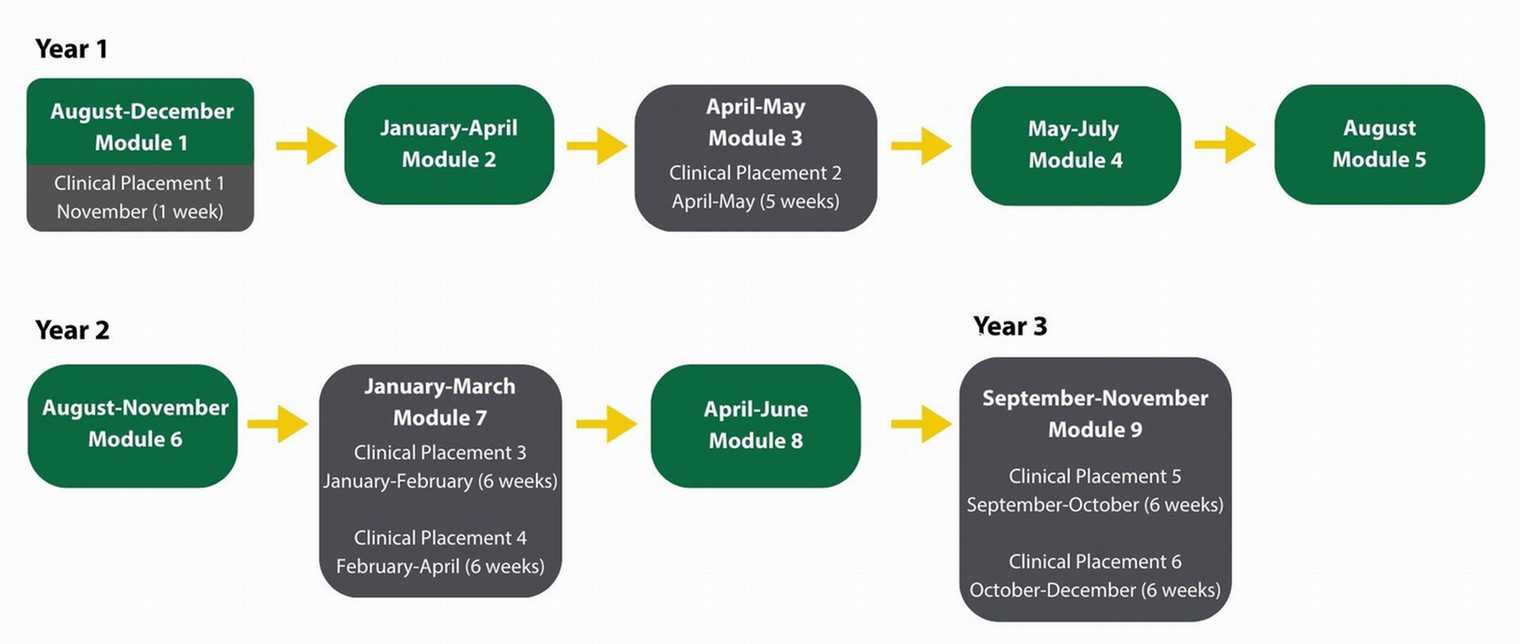
MPT Program Class of 2026 Timeline
The MPT program, class of 2026, is on a slightly different timeline for clinical placements.
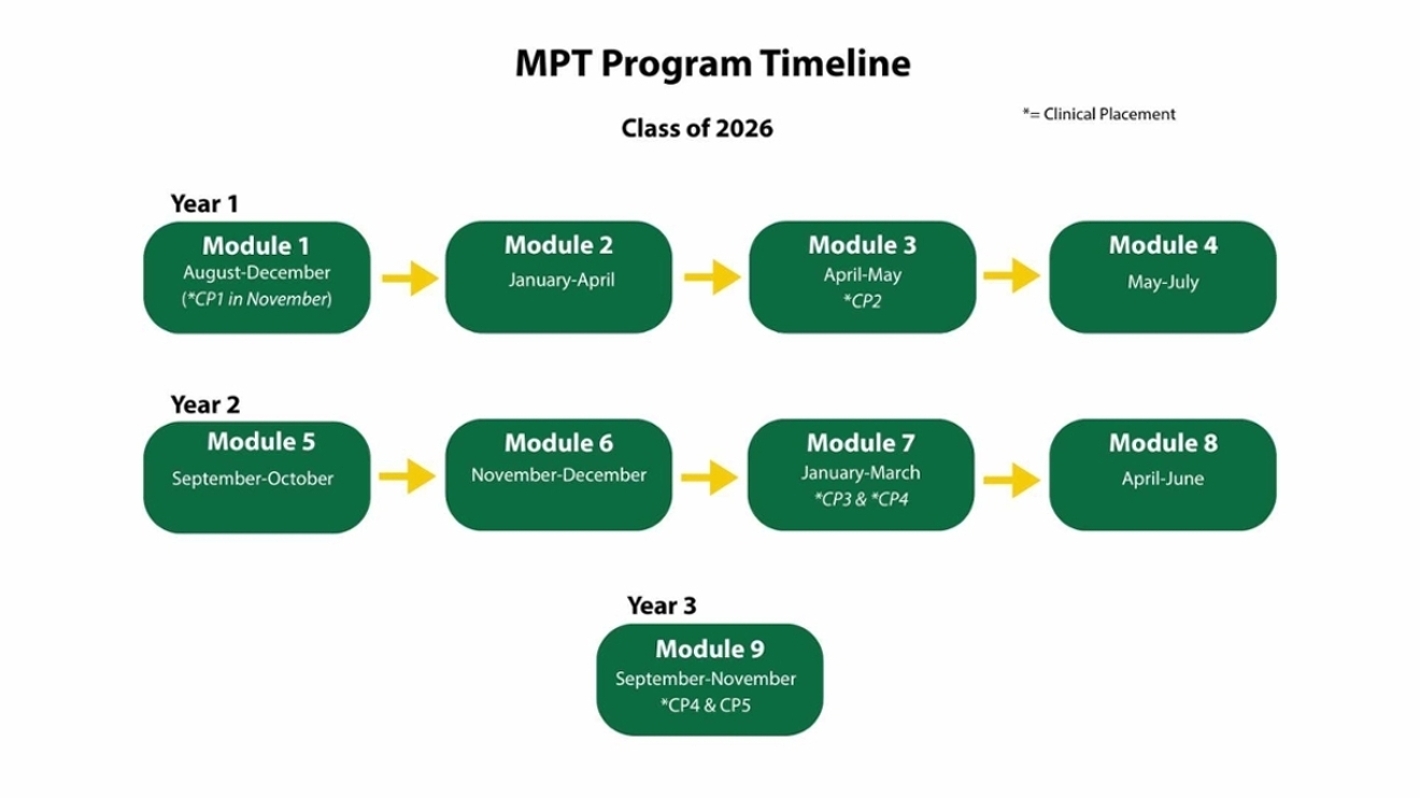
Clinical Instructor Experiences
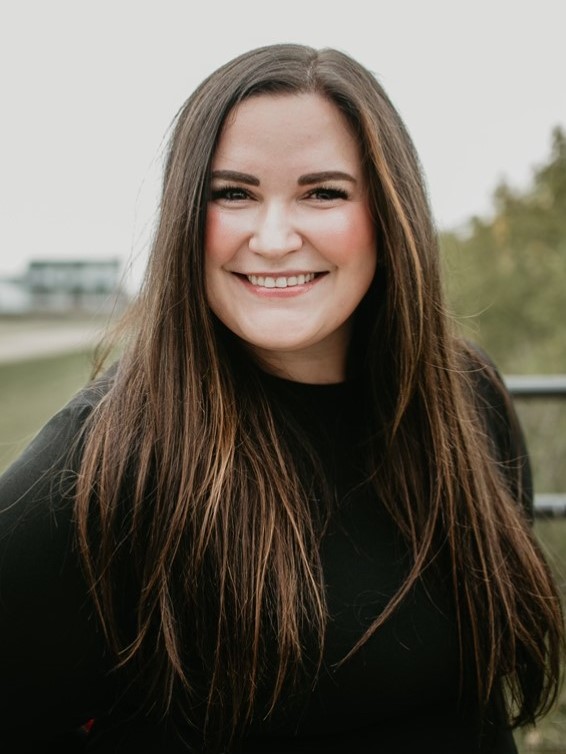 |
When I was a student, I had amazing experiences with many clinical instructors, however I also had a bad experience. It was all these experiences that drove me to become an instructor and in doing so, I made a promise to provide a safe, respectful, nurturing, judgment-free environment for students to learn, grow, and determine who they want to be as future practitioners. I always tell students that I want them to develop their own style or flow as a practitioner, to take the opportunity to develop it with my supervision. My biggest piece of advice for people interested in clinical instruction is to never forget that you were a student once too. Remember your “student self” and think about what would your “student self” would have needed to succeed. Think about all the hurdles that you had to figure out yourself in the first few years of practice before you finally felt confident as a practitioner and give that back to the student you have. Provide that sound board, problem solve together and grow together. - Megan Woloschuk, Clinical Instructor |
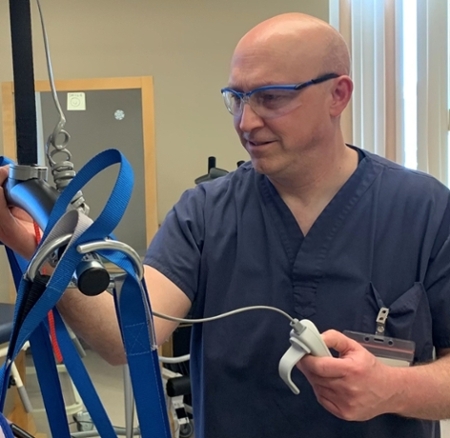 |
I chose to supervise as a clinical instructor after my first year of employment in a hospital setting of general practice. As my primary area of practice progressed in Cardiorespiratory PT, it was a privilege for me to work with students in an ideal sized hospital with ICU, general surgery, outpatients, and medicine wards which provided opportunities for students to meet the skill requirements in their training. Through student clinical instruction, I’ve had the opportunity to develop communication, leadership, and problem-solving skills, along with expectation setting, learning theory, and evidence informed practice in a multidisciplinary environment. These are skills that I use every day. Here I am 30 years later, and clinical supervision of students is part of my ongoing learning plan. You don’t need to be an “expert” in the practice environment or know it all to facilitate the learning of a PT student. Be open in communication. Be genuine. Keep your word on expectations set as you communicate and evaluate. Allow the learning to happen for yourself, and enjoy the challenge and the process. - Jason Pylatiuk, Clinical Instructor |
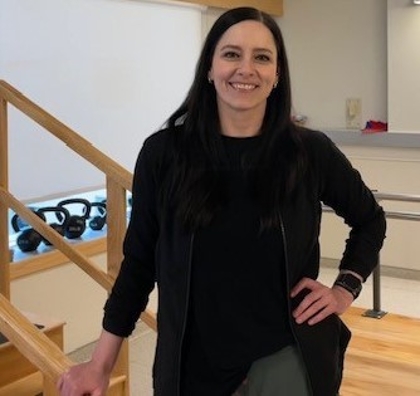 |
While taking on a student can feel overwhelming initially, I find setting clear expectations and learning goals right from the start to be incredibly helpful to ensure open communication and success. It is also important to work with the student to determine the learning strategies that work best for them so they are getting the most out of their experience. I encourage therapists to utilize the extensive knowledge and lived experienced of the other members of their team; in my experience, having the opportunity to shadow and work with other disciplines is a highlight of many students’ placements. It is also important to remember that there is no “perfect placement” and that almost any situation can be an amazing learning opportunity! - Danielle Johnston, Clinical Instructor |
MPT Program Clinical Courses
|
Duration and Location |
Learning Focus |
|
November (1 wk) School of Rehabilitation Science and clinical sites in Saskatoon |
Introduction to clinical placement sites and contexts Exposure to patient and family experience Introduction to ACP 2.0 |
|
Duration and Location |
Learning Focus |
|
April-May (5 wks) Clinical site (focus on rural, regional, remote locations) |
Broad clinical experience Manage or help manage a number of patients with a variety of diagnoses |
|
Assessment |
|
 |
|
|
Duration and Location |
Learning Focus |
|
Jan-April (6 wks) Clinical site |
Basic assessment and program planning in core systems Under supervision, take patient from admission to discharge for a portion of caseload |
|
Assessment |
|
 |
|
|
Duration and Location |
Learning Focus |
|
Feb-March (6 wks) Aug-Sept (6 wks) Clinical site |
Understand unique needs of different patient populations or diagnostic groups Under supervision, take patient from admission to discharge for an increased portion of caseload |
|
Assessment |
|
 |
|
|
Duration and Location |
Learning Focus |
|
Oct-Nov (5 wks) Clinical site |
Manage an increasingly complex caseload with multiple comorbidities, increasing injury and illness severity and some selected cases from specialized populations Caseload volume approaching that of a new graduate |
|
Assessment |
|
 |
|
Clinical Instructors and Sites
Taking on the role of a CI provides you with the opportunity to supervise one or more students on a clinical placement, provide mentorship and guide them toward their goal of becoming a physiotherapist.
Our students are placed across Saskatchewan and on occasion, inter-provincially
Students graduate as generalists, having developed skills in treating musculoskeletal, cardio respiratory and neurological conditions
Supervising students is a great way to both give back and grow the profession and counts towards continuing education requirements through the Saskatchewan College of Physical Therapists (SCPT)
Interested in having students at your site?
- Email us at srsceu@usask.ca
- A site review is completed either virtually or in-person
- If the site is deemed acceptable, further communication is sent out
- Your site becomes a member of our Clinical Education Advisory Committee (CEAC). This committee provides a communication link between the School of Rehabilitation Science and the clinical sites which participate in clinical education.
Interested in becoming a CI?
- Email us at srsceu@usask.ca
- Complete an orientation workshop for new Clinical Instructors (delivered virtually)
- Keep in touch with the Clinical Education unit - we can answer any inquiries you have and address any issues that arise
Clinical Instructor resources:
- Innovation in Clinical Education - Peer-Assisted Learning Webinar
- Preceptor Education Program
- Collaborative Placement Model Toolkit | Rise 360
Assessment resources:
- Canadian Physiotherapy Assessment of Clinical Performance (ACP) 2.0
- Student Assessment Module
- ACP Grading Resource
- ACP 2.0 Presentation
- ACP Online Education Module
- Student Evaluation of Clinical Placement
Supplementary resources:
